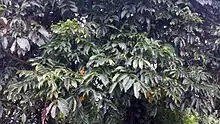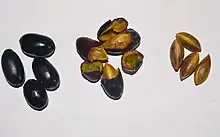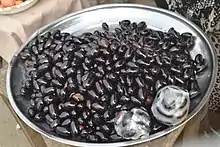Canarium schweinfurthii
Canarium schweinfurthii (commonly known as the bush candle, African olive,[2] African elemi, or canarium), is a species of large tree native to tropical Africa.[3] Names in many African languages are variations of mupafu.[4]
| African canarium | |
|---|---|
 | |
| Leaves of Canarium schweinfurthii | |
| Scientific classification | |
| Kingdom: | Plantae |
| Clade: | Tracheophytes |
| Clade: | Angiosperms |
| Clade: | Eudicots |
| Clade: | Rosids |
| Order: | Sapindales |
| Family: | Burseraceae |
| Genus: | Canarium |
| Species: | C. schweinfurthii |
| Binomial name | |
| Canarium schweinfurthii | |
Description
Because of similarities in their fruit and leaves, African elemi may be confused with Dacryodes edulis.[5]

Distribution and habitat
African elemi is found from the coast of Nigeria, Angola to Uganda.[5]
Uses
The African elemi tree is one of several sources of the economically useful oleoresin known elemi. In West Africa this resin is traditionally burned for fumigating dwellings and mixed with oil for body paint.[6] African elemi bears edible fruit with a thick, dense, hard shell.[5]

The hard stones of its fruit are used for traditional divination among Plateau speakers in the Middle Belt of central Nigeria.[2]
Notes
- "Canarium scheinfurthii". The Plant List. Retrieved 2016-09-26.
- Blench, Roger (2006). Archaeology, language, and the African past. Altamira Press. ISBN 9780759104655.
- ICRAF
- H. 1906, p. 173.
- H. 1906, p. 172.
- Mantell 1950, p. 233.
References
- ICRAF. "Canarium schweinfurthii". Retrieved 2013-11-15.
- H., J. H. (1906-01-01). "The Eben Tree of Old Calabar. (Pachylobus edulis, G. Don.)" (PDF). Bulletin of Miscellaneous Information (Royal Gardens, Kew). 1906 (5): 172–173. doi:10.2307/4111299. ISSN 0366-4457. JSTOR 4111299.
- Mantell, C. L. (1950-07-01). "The Natural Hard Resins: Their Botany, Sources and Utilization". Economic Botany. 4 (3): 203–242. doi:10.1007/bf02859481. ISSN 0013-0001. JSTOR 4251986.